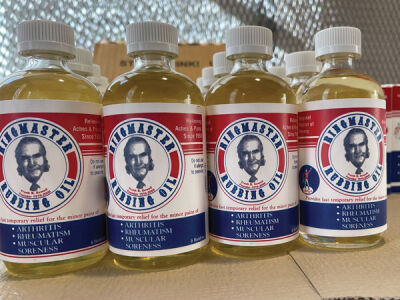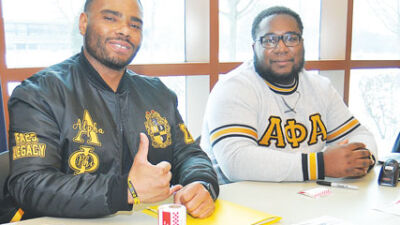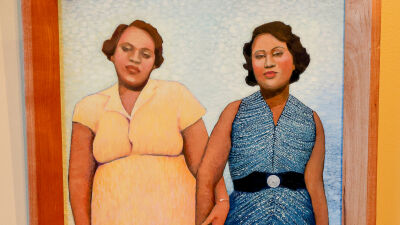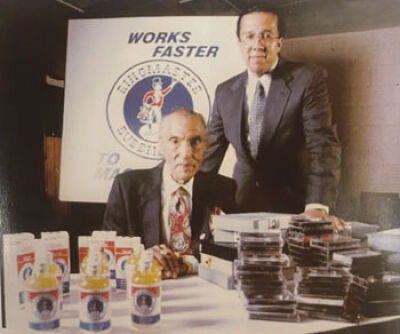
Frank B. Sewell and his son, Douglas Sewell, pose with the product and testimonial tapes.
Photo by Douglas Sewell
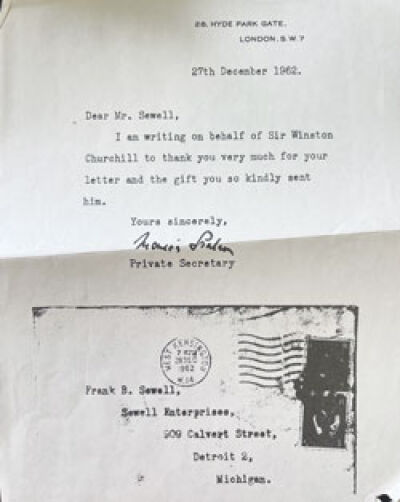
Doug Sewell describes his late father as an “avid” letter writer. This is a letter he received from Winston Churchill’s secretary thanking him for Ringmaster.
Photo by Douglas Sewell
SOUTHFIELD — The late Frank B. Sewell, 1916-2006, or as some called him, “The Ringmaster,” marched to the beat of his own drum.
He was an inventor, an entrepreneur, a traveling salesman and an ordained minister — though he never preached in a church.
He lived out his mission through the product he invented, Ringmaster Rubbing Oil. Though the product wasn’t officially marketed until 1950, Ringmaster’s story began decades prior.
Sewell’s grandfather, Morgan Ray, was an illiterate man and a street preacher. Passersby would mock the 80-year-old man. They were perplexed at how he couldn’t comprehend a simple sentence in the newspaper, yet could read and interpret the Bible fluently.
In 1932, a young Sewell joined the other kids jeering at his grandfather. This would be a pivotal moment in his life and journey with spiritualism, herbalism and homeopathic medicine. Sewell was afflicted with a deadly infection in his legs just days later. While at the Intensive Care Ward of Dayton Miami Valley Hospital, he overheard the doctor say, “If that young man survives the night, we will operate in the morning.” His grandfather visited him and prayed over him. That night, Sewell made a pact with God and his grandfather that he would do God’s work by helping others.
Throughout his adolescent years, Sewell would have more life-changing encounters. When he was 15 years old in Dayton, Ohio, he met George Washington Carver at the YMCA. Carver was doing a presentation with a 5-gallon container of peanuts, prompting kids to guess how many peanuts were in there. Doug Sewell, Frank’s son, explains that his father was very taken with Carver because he was a spiritualist.
“My father was the same type of guy. He would tell us stuff that we didn’t believe. We’d ask, ‘Daddy, why don’t you travel more?’ And he’d tell us, ‘I do,’ and that he would astral-project himself and go to these different places.”
In 1936, after strolling past the Classic Theater in Dayton and seeing a sign for Edgar Cayce, the “Sleeping Prophet,” Frank Sewell felt strongly compelled to enter the theater. Sewell was familiar with Cayce, having read his book. The Sleeping Prophet was famous for his ability to project himself into sick people’s bodies, diagnose them, and then suggest a treatment plan. He was also known for his ability to retain information from a book simply by lying on it and absorbing the information, never actually reading it. Cayce addressed the Dayton crowd, asking them to write down a question on a piece of paper and then hang onto the paper. Cayce then answered Frank Sewell’s question without having seen it. Doug Sewell retells his father’s story: “Cayce told the audience, ‘There’s a man in the audience by the name of Frank Sewell. And he has a two-part question. One: Should he move to Detroit? And No. 2, should he buy a new car?’ And he said, ‘well,’ he said, ‘Now is not the time to buy a new car, but your mission is in Detroit. I don’t know what it’s gonna be. But it’s gonna be hard.’ And it turns out it was pretty hard.”
Touched by this encounter, a 20-year-old Frank Sewell packed his bags and headed to Detroit hungry for his destiny. Having moved to Detroit during the Great Depression, Frank Sewell found himself doing odd jobs to stay afloat, “since at that time, he couldn’t just go to a bank and borrow money and then start a company. So, what he would do is work on small projects for people, like putting water tanks in their homes, and that’s how he would buy his raw materials and earn his money,” Doug Sewell said. Doug Sewell recalls as a boy going door to door with his father selling things, a tradition the two would keep into Doug’s adulthood as he became more immersed in the family’s business, Painex Corp.
In 1947, Frank Sewell began experimenting in anticipation of creating a medication that would alleviate body aches and pains. Despite his knowledge of chemistry, he struggled for a few years to create a successful formula. Doug Sewell recollects that it wasn’t until 1949, when George Washington Carver appeared to his father in a dream and showed him how to mix the formula, that he was able to get the right blend of the methyl salicylate, a derivative of birch, Doug Sewell explains, and peanut oil, an homage to the works of Carver.
Sewell saw the success of the newly minted product after the wife of a retired sea captain with an amputation approached him for something to ease her husband’s pain. After applying the product just once, they were amazed to find that the sea captain slept peacefully through the night for the first time in years. Frank Sewell states that after the wife called again two weeks later asking for more of the product, he knew that he had the correct formula.
Now that he had the formula, all he needed was a name for the product. In an excerpt from his autobiography, Frank Sewell writes, “The only thing lacking from the rubbing oil when I dreamed the formula was a name. I concentrated several days on a name, and finally the name came, appeared written on the piece of paper I had been writing on at the kitchen table. I remember at the time I sat at the table, such thoughts were going through my mind, ‘You are suffering from weak almost crippled legs. Your left lung had adhesions. You have six children of your own, three boys and three girls, the eldest only 10 years old and the youngest six months old and all these problems besetting you and on top of everything you are without money.’ With such thoughts going through my mind the word ‘ringmaster’ appeared written on the paper I had been writing on. I sat there and thought of the significance of the word Ringmaster.”
Frank Sewell would then spend the next few years traveling the country, giving Ringmaster away for free to those who needed it, praying for their healing as he applied it to them.
Doug Sewell remembers his family loading up his 1956 blue Ford with a trunk full of Ringmaster.
“When he would go down south, he would pray with people, evangelize them and offer wisdom and advice and things like that. So, by the time he got back from his travels, his trunk would be empty. He would always record people and their recoveries.”
As Frank Sewell declined in his later years, Doug Sewell joined him on the road equipped with a video camera to record the testimonials of the people using Ringmaster. Soon they were able to fill a 9-by-12-foot room with testimonial tapes speaking to the effectiveness of Ringmaster Rubbing Oil.
Located just down the street from Painex’s headquarters, Dr. Herman J Glass II, one of the first African American chiropractors in the area and the first Black doctor appointed on the board of examiners in 1988, swears by Ringmaster Rubbing Oil in his practice. In his 40 years of practicing, the Southfield-based doctor said, “Back in the ’80s and early ’90s, I compared it side by side with other products, Icy Hot, Biofreeze. Ringmaster was the best stuff that I’ve used on patients. That oil sinks through the dermal layer, penetrating the nerve root deeper than all those creams.”
Carrying on Frank Sewell’s legacy, the Sewell family, to this day, makes a point to pray over the formula before it is poured into the glass bottles and sent out. Doug Sewell believes that they can take prayer and positive feelings and incarnate that into a result.
“We continue to pray over the product. My sister comes whenever we make a new batch, and we both pray over it.”
 Publication select ▼
Publication select ▼